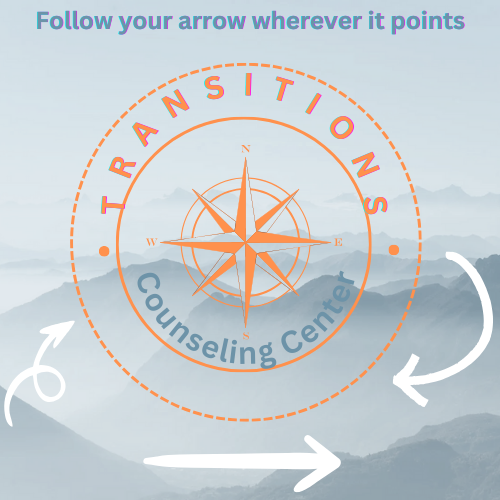
OFFERING NON-JUDGMENTAL COUNSELING SESSIONS
At Transitions Counseling Center, LLC, I want you to... be the leader of your own path. As your compass, I am here to help you reach your preferred destination through tailored treatment plans and discussions.

OFFERING NON-JUDGMENTAL COUNSELING SESSIONS
At Compass Orange Bullying Prevention and Counseling Center, LLC, I want you to... be the leader of your own path. As your compass, I am here to help you reach your preferred destination through tailored treatment plans and discussions.
My Approaches
To give you personalized counseling sessions, I combine the approaches from various therapies:
- Client-Centered
- Cognitive-Behavioral
- Rational Emotive Behavior
My Specialties
Some of the topics I specialize in include but are not limited to:
- Adverse Childhood Experiences (ACEs)
- Anxiety
- Bullying Prevention
- Depression
- Gender Dysphoria
- LGBTQ Issues
- Low Self-Esteem
- Trauma

The Alluring Appeal of Orange
Orange is a color that brings delight, energy, warmth, and calmness, because of its red and yellow hues. Most outdoor elements, such as tropical surroundings, are also associated with this playful and inviting shade.

The Alluring Appeal of Orange
Orange is a color that brings delight, energy, warmth, and calmness, because of its red and yellow hues. Most outdoor elements, such as tropical surroundings, are also associated with this playful and inviting shade.
Inspiring Emotional Strength
When discouraged, we can find solace in the color orange because it encourages us to depend on our emotional understanding and intuition. The security and strength it offers remind us of the light that will welcome us at the end of a dark tunnel.
Encouraging Optimism
Known as one of the cheeriest shades, the color orange brings hope, positivity, and motivation. Its ecstatic spirit will help us look on the brighter side of life.
Stimulating Adrenaline Junkies
Orange encourages spontaneity, which is why this color speaks much to adventure enthusiasts and those who want to step out of their comfort zones. It also promotes confidence as its citrusy shade brings courage to people who want to face their fears.
Welcoming Both Sides
As a color that doesn’t exclude or judge, orange welcomes social interaction while also acknowledging that it isn’t for everyone. It inspires people to participate in pleasantries but also reassures those who want to be reserved.
BRINGING LIFE TO MILLENNIALS
Many of the younger generations are fond of the color orange because of its youthful and spiritually freeing glow. It encapsulates the childlike wonder and active spirit of Generation Y to explore the great unknowns.
Complementing Orange
Blue sits on the opposite side of orange in the color wheel, which means they are complementary colors. The colors of both orange and blue represent bullying prevention.

Knowing an Orange Butterfly’s Significance
Feelings
Seeing an orange butterfly brings feelings of bliss, idealism, life, consciousness, and joy.
Association
It is associated with passion, wellness, health, courtesy, friendliness, and liveliness.
Passion
Seeing an orange butterfly can be a sign of encouragement to an individual who is currently working or pursuing a project. While it brings inspiration, the passion of an orange butterfly can also be interpreted to be aggressive.
Summarizing the Meaning of Orange
As a unique color, orange has an allure and magnetism that one can’t resist. It represents the following important aspects of life:
- Familiarity
- Fearlessness
- Fire
- Freedom
- Possibility
- Understanding
Choose My Counseling Center
Take the first step to overcoming your fears by choosing me as your counselor. Get in touch with me today to learn more about my services. I will gladly provide answers to your questions.
Summarizing the Meaning of Orange
As a unique color, orange has an allure and magnetism that one can’t resist. It represents the following important aspects of life:
- Familiarity
- Fearlessness
- Fire
- Freedom
- Possibility
- Understanding
Choose My Counseling Center
Take the first step to overcoming your fears by choosing me as your counselor. Get in touch with me today to learn more about my services. I will gladly provide answers to your questions.
What Are Adverse Childhood Experiences?
Adverse Childhood Experiences, or ACES for short, are potentially traumatic events that occur in childhood before the age of 18. These events can have a significant impact on an individual’s physical health, social and emotional wellness, and opportunities in the future.
Examples of these may include violence, abuse, or neglect at home, growing up in a household with substance abuse issues, or a family member attempting or dying by suicide.
According to the Center for Disease Control (CDC), 61% of adults have experienced at least one ACE, while 16% had 4 or more types of ACEs. Females and racial and ethnic minority groups were also found to be at greater risk for experiencing 4 or more ACEs.
What many people fail to realize is that exposure to ACEs is associated with an increased risk for health problems across one’s lifespan.


What is Anxiety?
Anxiety is the body’s response to situations that are interpreted as threatening. Not only can it lead to avoidance or unpleasant physical, emotional, and cognitive symptoms, but it can also distort our thinking by causing us to overestimate the likelihood of something going wrong.
There are a few methods that are effective in coping with anxiety including:
- Deep Breathing
- Progressive Muscle Relaxation
- Challenging Irrational Thoughts


What Is Depression?
Depression has three primary causes: genetics, chemical imbalances, and traumatic events experienced in the past. It is often manifested in the form of:
- Depressed Moods
- Sleep Difficulties
- Loss of Interest or Pleasure
- Experiencing Fatigue Nearly Every Day
- Significant Weight Change
- Feelings of Worthlessness
- Diminished Concentration
- Recurring Thoughts of Death

What Is Depression?
Depression has three primary causes: genetics, chemical imbalances, and traumatic events experienced in the past. It is often manifested in the form of:
- Depressed Moods
- Sleep Difficulties
- Loss of Interest or Pleasure
- Experiencing Fatigue Nearly Every Day
- Significant Weight Change
- Feelings of Worthlessness
- Diminished Concentration
- Recurring Thoughts of Death
Cognitive Behavioral Therapy and Depression
Cognitive Behavioral Therapy (CBT) works by changing automatic negative thoughts and behaviors. Considered the most researched form of psychotherapy for depression, it has been found to be equally, if not more effective than medicine in plenty of cases.
Cognitive Behavioral Therapy and Depression
Cognitive Behavioral Therapy (CBT) works by changing automatic negative thoughts and behaviors. Considered the most researched form of psychotherapy for depression, it has been found to be equally, if not more effective than medicine in plenty of cases.
FACTS OF SCHOOL BULLYING

Definition of Bullying O.C.G.A 20-2-751.4
An act that occurs on school property, in school vehicles, at designated school bus stops, or at school-related functions and activities, or by use of data or software that is accessed through a computer, computer system, computer network, or other electronic technology of a local school system that is:
01
Any willful attempt or threat to inflict injury on another person when accompanied by an apparent present ability to do so
02
Any intentional display of force such as would give the victim reason to fear or expect immediate bodily harm
03
Any written, verbal, or physical act that a reasonable person would receive as being intended to threaten, harass, or intimidate
Definition of Bullying O.C.G.A 20-2-751.4
An act that occurs on school property, in school vehicles, at designated school bus stops, or at school-related functions and activities, or by use of data or software that is accessed through a computer, computer system, computer network, or other electronic technology of a local school system that is:
01
Any willful attempt or threat to inflict injury on another person when accompanied by an apparent present ability to do so
02
Any intentional display of force such as would give the victim reason to fear or expect immediate bodily harm
03
Any written, verbal, or physical act that a reasonable person would receive as being intended to threaten, harass, or intimidate
Simplified Definition of Bullying
Causing repetitive, intentional harm

Three Main Components
Repetitive
Bullying behaviors happening more than once
Intentional
Bullying is not something that happens by accident. It is purposeful.
Power-Based
Kids who bully use their power, such as physical strength, access to embarrassing information, or popularity, to control or harm others.
Three Main Components
Repetitive
Bullying behaviors happening more than once
Intentional
Bullying is not something that happens by accident. It is purposeful.
Power-Based
Kids who bully use their power, such as physical strength, access to embarrassing information, or popularity, to control or harm others.
Types of Bullying
Physical
Hurting a Person’s Body or Possessions
- Hitting, Kicking, Pinching
- Spitting
- Tripping/Pushing
- Taking or Breaking Someone’s Things
- Making Mean or Rude Hand Gestures
Verbal
Saying or Writing Mean Things
- Teasing
- Name-Calling
- Inappropriate Sexual Comments
- Threatening To Cause Harm
Social
Hurting Someone’s Reputation or Relationships
- Leaving Someone Out on Purpose
- Telling Others Not To Be Friends With Someone
- Spreading Rumors About Someone
Types of Bullying
Physical
Hurting a Person’s Body or Possessions
- Hitting, Kicking, Pinching
- Spitting
- Tripping/Pushing
- Taking or Breaking Someone’s Things
- Making Mean or Rude Hand Gestures
Verbal
Saying or Writing Mean Things
- Teasing
- Name-Calling
- Inappropriate Sexual Comments
- Threatening To Cause Harm
Social
Hurting Someone’s Reputation or Relationships
- Leaving Someone Out on Purpose
- Telling Others Not To Be Friends With Someone
- Spreading Rumors About Someone
Roles Involved in Bullying
-
Bully
Individuals who engage in bullying behaviors toward their peers
-
Victims
Individuals who are targets of bullying behavior
-
Bully/Victims
Individuals who are both bullies and victims
-
Bystanders
They neither reinforce nor defend the bullying behavior
-
Upstanders
These children actively comfort the child being bullied and may come to the child's defense when bullying occurs.
What Is Cyberbullying?
Cyberbullying includes sending, posting, or sharing negative, harmful, false, or mean content about someone else that takes place over digital devices.
Social Media
Text Messaging
Online Gaming
Amendment to O.C.G.A
20-2-751.4
Hb 131 (2015)
The End to Cyberbullying Act
Adds CYBERBULLYING which occurs through the use of electronic communication, whether or not such electronic act originated on school property or with school equipment if the electronic communication:
1
Is directed specifically at students or school personnel
2
Is maliciously intended for the purpose of threatening the safety of those specified or substantially disrupting the orderly operation of the school
3
Creates a reasonable fear of harm to the students' or school personnel's person or property or has a high likelihood of succeeding in that purpose
Amendment to O.C.G.A
20-2-751.4
Hb 131 (2015)
The End to Cyberbullying Act
Adds CYBERBULLYING which occurs through the use of electronic communication, whether or not such electronic act originated on school property or with school equipment if the electronic communication:
1
Is directed specifically at students or school personnel
2
Is maliciously intended for the purpose of threatening the safety of those specified or substantially disrupting the orderly operation of the school
3
Creates a reasonable fear of harm to the students' or school personnel's person or property or has a high likelihood of succeeding in that purpose
what to do if you've been bullied
GaDOE Bullying Policy
1. Investigate
Upon receipt of any report of bullying, the school will direct an immediate investigation involving appropriate personnel. The investigation will begin no later than the following school day.
2. Notify
At an appropriate time during or after the investigation, parents/guardians of the accused and the victim must be notified.
GaDOE Bullying Policy
3. Discipline
Upon confirming that bullying has occurred, the accused student should be charged with bullying and given an age-appropriate consequence.
4. Alternative School
Students in grades 6th to 12th found to have committed the offense of bullying for the third time in a school year can be assigned to an alternative school through due process.
